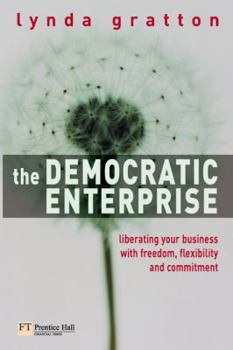The Democratic Enterprise: Liberating Your Business With Freedom, Flexibility and Commitment
How can we change the way we manage and organize people to make the most of their talent and energy? The free to choose are fast to act for an enterprise they believe in, but they're also the first to... This description may be from another edition of this product.
Format:Hardcover
Language:English
ISBN:0273675281
ISBN13:9780273675280
Release Date:January 2004
Publisher:Ft Pr
Length:256 Pages
Weight:1.35 lbs.
Dimensions:9.8" x 1.0" x 6.8"
Customer Reviews
3 ratings
excellent contribution
Published by Thriftbooks.com User , 16 years ago
This book makes an excellent contribution to describing the dynamics of organizations that we will need for the 21st century - in which a heightened sense of shared purpose will be required in order to deliver heightened performance from communities of knowledge workers.
Dimensions of Corporate "Citizenship" in the 21st Century
Published by Thriftbooks.com User , 20 years ago
Gratton asserts (and I wholly agree) that there are many compelling reasons for any organization -- regardless of size or nature -- to become and then remain what she characterizes as a "democratic enterprise." Here are five on which she focuses throughout this brilliant book: 1. Employees who experience democracy are more engaged. 2. Democratic enterprises create win-win situations. 3. Democratic enterprises are more just and fair. 4. Democratic enterprises are more agile. 5. Democratic enterprises are more able to integrate. It is no coincidence that when Fortune magazine publishes its annual lists of the most admired, best to work for, and most profitable corporations, respectively, several names appear on all three and others appear on at least two. To varying degrees, all are (by Gratton's definition) democratic enterprises. At this point, I feel obliged to reassure those who read my brief commentary that this book is mercifully free of esoteric theories, hypotheses, etc. which so frequently descend from various ivory towers like leaflets. She devotes all of the first chapter to what she calls "Citizens' Tales." She introduces her reader to three corporate executives -- Greg Grimshaw (BP), Nina Bhatia (McKinsey), and Stewart Kearney (BT) -- and carefully explains how why each is important to her/his company, what each has done to be the best he/she could be, and what her/his company has done to sup[port those efforts. Citing reasons such as those listed earlier is easy. Validating and verifying them in the careers of three people is infinitely more difficult and Gratton succeeds brilliantly. Grimshaw, Bhatia, and Kearney are representative in that they "reflect the choices and dilemmas faced in day-to-day working lives...By observing them and the companies in which they work we are witnesses to the ebbs and flows of the contemporary enterprise...[They are] citizens rather than employees [because] they are adopting some of the conditions of citizenship and all are members of companies adopting some of the tenets of democracy." According to Gratton, it is in the best interests of institutions and organizations to serve the best interests of their "citizens." Why? First, by encouraging individuals to become autonomous and agile, they will themselves become more agile. Next, if they are committed and purposeful, their people will be committed and purposeful. Finally, the tenets of democracy (discussed in depth, pages 33-42) create an appropriate platform to integrate diverse business initiatives. In Chapter Two, Gratton briefly examines various forms of democracy (classical, liberal, direct, competitive/elitist, and legal) and the aforementioned tenets of democracy. Then in the following chapters (Three through Eight), she discusses "The Democratic Study" (which explores the six tenets in greater depth), "The Drivers to Democracy" (e.g. shifts in individuals and in technology), "Building Individual Autonomy" (i.e. how both individuals an
Truly Inspirational Work
Published by Thriftbooks.com User , 21 years ago
I went through The Democratic Enterprise recently and my thoughts mid-way into the book were "here's a work that truly captures the essence of the organisation of today and tomorrow, where both individual and organisation have a shared responsibility to religiously connect on a mental plane for a greater purpose." All chapters are relevant and intellectually stimulating especially chapters 5, 6 and 7 on "individual autonomy, organisational variety and shaping shared purpose," which form the heart and soul of this immensely thoughtful and inspirational work. The capacity of the "individual-employees" to behave as "adults along with their capacity for self awareness" interlinked with the capability of the processes and practices within the organisation to enable employees exercise choices through "creation of variety" and the establishment of a shared common purpose through an environment of mutual trust and support was very well argued and presented. It clearly brings out the all important roles the individual and the organisation bring to the table and collaborate to create the "democratic enterprise." The elements of the Human Capital Model made wonderful reading and further built on her landmark article co-authored with Professor Sumantra Ghoshal on "Personal Human Capital: New Ethos for the Volunteer Employee" (EMJ - Feb.'03).This book should be required reading for all, be it the leader, the line manager, the HR professional, the young executive, all individuals who have a common stake in the organisation and have invested their "human capital" towards shaping a shared purpose.A great followup on her previous inspirational work on Living Strategy.





